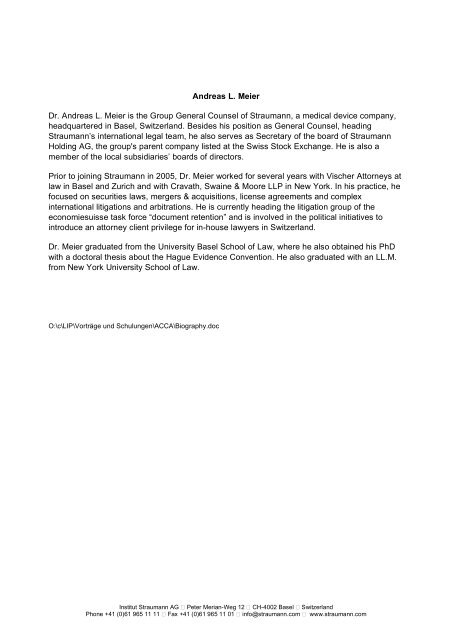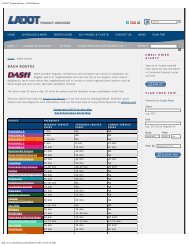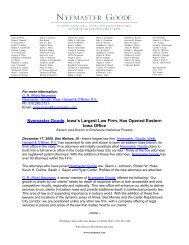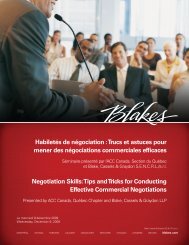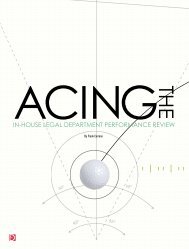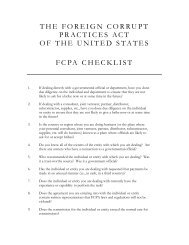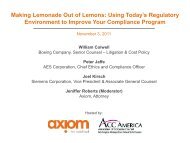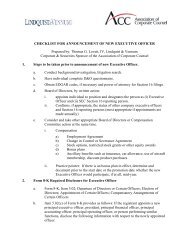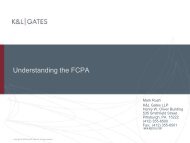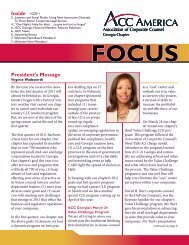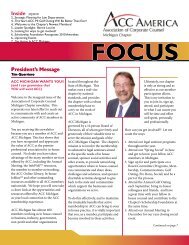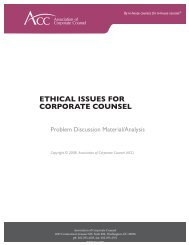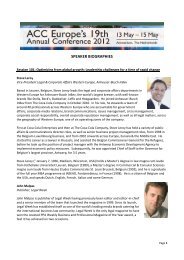Andreas L. Meier Dr. Andreas L. Meier is the Group General ...
Andreas L. Meier Dr. Andreas L. Meier is the Group General ...
Andreas L. Meier Dr. Andreas L. Meier is the Group General ...
Create successful ePaper yourself
Turn your PDF publications into a flip-book with our unique Google optimized e-Paper software.
<strong>Andreas</strong> L. <strong>Meier</strong><br />
<strong>Dr</strong>. <strong>Andreas</strong> L. <strong>Meier</strong> <strong>is</strong> <strong>the</strong> <strong>Group</strong> <strong>General</strong> Counsel of Straumann, a medical device company,<br />
headquartered in Basel, Switzerland. Besides h<strong>is</strong> position as <strong>General</strong> Counsel, heading<br />
Straumann’s international legal team, he also serves as Secretary of <strong>the</strong> board of Straumann<br />
Holding AG, <strong>the</strong> group's parent company l<strong>is</strong>ted at <strong>the</strong> Sw<strong>is</strong>s Stock Exchange. He <strong>is</strong> also a<br />
member of <strong>the</strong> local subsidiaries’ boards of directors.<br />
Prior to joining Straumann in 2005, <strong>Dr</strong>. <strong>Meier</strong> worked for several years with V<strong>is</strong>cher Attorneys at<br />
law in Basel and Zurich and with Cravath, Swaine & Moore LLP in New York. In h<strong>is</strong> practice, he<br />
focused on securities laws, mergers & acqu<strong>is</strong>itions, license agreements and complex<br />
international litigations and arbitrations. He <strong>is</strong> currently heading <strong>the</strong> litigation group of <strong>the</strong><br />
economiesu<strong>is</strong>se task force “document retention” and <strong>is</strong> involved in <strong>the</strong> political initiatives to<br />
introduce an attorney client privilege for in-house lawyers in Switzerland.<br />
<strong>Dr</strong>. <strong>Meier</strong> graduated from <strong>the</strong> University Basel School of Law, where he also obtained h<strong>is</strong> PhD<br />
with a doctoral <strong>the</strong>s<strong>is</strong> about <strong>the</strong> Hague Evidence Convention. He also graduated with an LL.M.<br />
from New York University School of Law.<br />
O:\c\LIP\Vorträge und Schulungen\ACCA\Biography.doc<br />
Institut Straumann AG Peter Merian-Weg 12 CH-4002 Basel Switzerland<br />
Phone +41 (0)61 965 11 11 Fax +41 (0)61 965 11 01 info@straumann.com www.straumann.com
Understanding and maximizing<br />
<strong>the</strong> protection of legal<br />
professional privilege<br />
<strong>Dr</strong>. <strong>Andreas</strong> L. <strong>Meier</strong><br />
ACC Europe 2007 Annual Conference: The Growing Role of In-house Counsel:<br />
Lawyers as Business Partners<br />
3-5 June 2007 Bayer<strong>is</strong>cher Hof Hotel,<br />
Munich, Germany
Current Situation in Europe –<br />
Switzerland as an example<br />
In-house counsel have no legal privilege and (in <strong>the</strong><br />
view of <strong>the</strong> Sw<strong>is</strong>s Supreme Court) also no<br />
professional secrecy obligations<br />
Outside counsel who are admitted to <strong>the</strong> Sw<strong>is</strong>s bar are<br />
bound by professional secrecy obligations. No<br />
privilege if documents with legal advice are collected<br />
in <strong>the</strong> offices of <strong>the</strong> client (e.g. <strong>the</strong> Legal Department<br />
of a Corporation)<br />
ACC Europe 2007 Annual Conference: The Growing Role of In-house<br />
Counsel: Lawyers as Business Partners<br />
3-5 June 2007 Bayer<strong>is</strong>cher Hof Hotel<br />
Munich, Germany
Increasing Importance of <strong>the</strong> Legal<br />
Privilege for In-house Counsel<br />
Evolving Role of In-house Counsel<br />
Increasing density of regulations<br />
Society expects that companies fully understand and<br />
comply with <strong>the</strong> law<br />
Companies expect guidance from In-house Counsel<br />
In-house Counsel must be pro-active <strong>is</strong>sue-spotters<br />
Avoid potential d<strong>is</strong>advantage for Sw<strong>is</strong>s<br />
multinational corporations with its headquarters in<br />
Switzerland<br />
ACC Europe 2007 Annual Conference: The Growing Role of In-house<br />
Counsel: Lawyers as Business Partners<br />
3-5 June 2007 Bayer<strong>is</strong>cher Hof Hotel<br />
Munich, Germany
Increasing Importance of <strong>the</strong> Legal<br />
Privilege for In-house Counsel II<br />
Communications per e-mail facilitate <strong>the</strong> fact finding<br />
of governmental authorities and d<strong>is</strong>coveries of<br />
counterparties in U.S. litigations<br />
E – D<strong>is</strong>covery without legal privilege deprives inhouse<br />
counsel of a „bug-proof“ room and may hinder<br />
<strong>the</strong> fulfillment of <strong>the</strong>ir tasks<br />
ACC Europe 2007 Annual Conference: The Growing Role of In-house<br />
Counsel: Lawyers as Business Partners<br />
3-5 June 2007 Bayer<strong>is</strong>cher Hof Hotel<br />
Munich, Germany
D<strong>is</strong>advantages due to incons<strong>is</strong>tent<br />
conflict of laws analys<strong>is</strong> by some<br />
U.S. Courts<br />
No protection under <strong>the</strong> Hague Evidence Convention<br />
for European companies as defendants in U.S. courts<br />
(→ U.S. law)<br />
Communications with European in-house counsel may<br />
not be protected (→ law of <strong>the</strong> place where <strong>the</strong><br />
privileged relationship was entered into)<br />
ACC Europe 2007 Annual Conference: The Growing Role of In-house<br />
Counsel: Lawyers as Business Partners<br />
3-5 June 2007 Bayer<strong>is</strong>cher Hof Hotel<br />
Munich, Germany
Hague Convention of 18 March 1970 on <strong>the</strong> Taking of<br />
Evidence Abroad in Civil or Commercial Matters<br />
(Hague Evidence Convention)<br />
Article 11<br />
In <strong>the</strong> execution of a Letter of Request <strong>the</strong> person<br />
concerned may refuse to give evidence in so far as he<br />
has a privilege or duty to refuse to give <strong>the</strong> evidence –<br />
a) under <strong>the</strong> law of <strong>the</strong> State of execution; or<br />
b) under <strong>the</strong> law of <strong>the</strong> State of origin, and <strong>the</strong><br />
privilege or duty has been specified in <strong>the</strong> Letter,<br />
or, […]<br />
ACC Europe 2007 Annual Conference: The Growing Role of In-house<br />
Counsel: Lawyers as Business Partners<br />
3-5 June 2007 Bayer<strong>is</strong>cher Hof Hotel<br />
Munich, Germany
Specific Relevance for European<br />
Corporations<br />
U.S. courts apply <strong>the</strong> Hague Evidence Convention to<br />
independent third parties only (Aérospatiale, 482 U.S.<br />
522)<br />
Incons<strong>is</strong>tent dec<strong>is</strong>ions in <strong>the</strong> U.S. with respect to legal<br />
advice of foreign In-house Counsel and patent agents<br />
(Saxholm AS v. Dynal Inc. (164 F.R.D. 331, 339,<br />
E.D.N.Y. 1996); Reified Corp. vs. Remy Martin (98<br />
F.R.D. 442))<br />
European corporations often lack a comprehensive<br />
document retention program (especially for e-mails)<br />
ACC Europe 2007 Annual Conference: The Growing Role of In-house<br />
Counsel: Lawyers as Business Partners<br />
3-5 June 2007 Bayer<strong>is</strong>cher Hof Hotel<br />
Munich, Germany
Switzerland‘s Approach to amend<br />
<strong>the</strong> current situation<br />
<strong>Dr</strong>aft Code of Criminal Procedure shall include an<br />
Attorney Client Privilege<br />
Reasoning:<br />
Encourage open, honest communication between inhouse<br />
counsel and <strong>the</strong>ir corporate client<br />
avoid that governmental authorities have easy access to<br />
relevant information in dawn raids<br />
avoid that U.S. Courts refuse to award <strong>the</strong> attorney<br />
client privilege to European Inhouse Counsels<br />
ACC Europe 2007 Annual Conference: The Growing Role of In-house<br />
Counsel: Lawyers as Business Partners<br />
3-5 June 2007 Bayer<strong>is</strong>cher Hof Hotel<br />
Munich, Germany
Thank You.<br />
ACC Europe 2007 Annual Conference: The Growing Role of In-house<br />
Counsel: Lawyers as Business Partners<br />
3-5 June 2007 Bayer<strong>is</strong>cher Hof Hotel<br />
Munich, Germany
What <strong>is</strong> Legal Professional Privilege?<br />
Protection awarded to certain communications between a lawyer and <strong>the</strong>ir client<br />
Across Europe <strong>the</strong> level of protection varies, particularly with respect to <strong>the</strong> treatment of in-house counsel. Why <strong>is</strong> it<br />
important to in-house counsel?<br />
Allows clients to be honest when seeking advice and allows lawyers to be fearless when giving <strong>the</strong>ir advice<br />
BUT even in jur<strong>is</strong>dictions like <strong>the</strong> UK that have traditionally had a high level of protection, privilege <strong>is</strong> under attack.<br />
In-house counsel need to understand and educate <strong>the</strong>ir businesses on <strong>the</strong> scope of privilege and how to maintain it<br />
ACC Europe 2007 Annual Conference: The Growing Role of In-house<br />
Counsel: Lawyers as Business Partners<br />
3-5 June 2007 Bayer<strong>is</strong>cher Hof Hotel<br />
Munich, Germany
In-house Lawyers and Privilege in <strong>the</strong> UK<br />
Under Engl<strong>is</strong>h law, privilege can apply provided communication <strong>is</strong> in capacity of legal adv<strong>is</strong>er, not in an executive<br />
capacity<br />
Covers all members of <strong>the</strong> legal profession, solicitors and barr<strong>is</strong>ters. Privilege extends to trainees and paralegals (so<br />
long as properly superv<strong>is</strong>ed)<br />
No need for a current pract<strong>is</strong>ing certificate (what benefit do in-house counsel derive from holding pract<strong>is</strong>ing<br />
certificates anyway?)<br />
ACC Europe 2007 Annual Conference: The Growing Role of In-house<br />
Counsel: Lawyers as Business Partners<br />
3-5 June 2007 Bayer<strong>is</strong>cher Hof Hotel<br />
Munich, Germany
Outline of Legal Professional Privilege in <strong>the</strong><br />
UK<br />
Legal Advice Privilege<br />
confidential communications between lawyer and<br />
client<br />
for <strong>the</strong> dominant purpose of seeking or giving<br />
legal advice<br />
lawyers must be acting in <strong>the</strong>ir legal professional<br />
capacity<br />
no need for litigation to be anticipated<br />
ACC Europe 2007 Annual Conference: The Growing Role of In-house<br />
Counsel: Lawyers as Business Partners<br />
Litigation Privilege<br />
confidential communications<br />
between lawyer and client, or between ei<strong>the</strong>r and<br />
third party<br />
dominant purpose of giving/seeking legal advice<br />
or ga<strong>the</strong>ring evidence<br />
There must be a “real likelihood” of litigation or<br />
litigation <strong>is</strong> actually underway<br />
Applies to proceedings in court, employment<br />
tribunals and arbitrations<br />
Investigations and inquiries? Depends whe<strong>the</strong>r<br />
adversarial or merely fact-ga<strong>the</strong>ring<br />
3-5 June 2007 Bayer<strong>is</strong>cher Hof Hotel<br />
Munich, Germany
Three Rivers - Background<br />
Following <strong>the</strong> collapse of BCCI <strong>the</strong> UK government set up an inquiry to investigate <strong>the</strong> superv<strong>is</strong>ion of BCCI by <strong>the</strong><br />
Bank of England.<br />
Bank had set up committee of three Bank officials (<strong>the</strong> "Bingham Inquiry Unit") which was responsible for<br />
communications with <strong>the</strong> Inquiry and external lawyers<br />
Claims by BCCI creditors against Bank of England including <strong>the</strong> Three Rivers Council for <strong>the</strong> little known tort of<br />
“m<strong>is</strong>feasance in a public office”.<br />
Claimants applied for d<strong>is</strong>closure of documents that had been created during Bingham Inquiry into <strong>the</strong> superv<strong>is</strong>ion of<br />
BCCI by <strong>the</strong> relevant UK authorities<br />
It was accepted that litigation privilege did not apply (as <strong>the</strong> Inquiry was non-adversarial) so <strong>the</strong> judgements were<br />
strictly concerned with legal advice privilege<br />
ACC Europe 2007 Annual Conference: The Growing Role of In-house<br />
Counsel: Lawyers as Business Partners<br />
3-5 June 2007 Bayer<strong>is</strong>cher Hof Hotel<br />
Munich, Germany
Three Rivers – Points to Note<br />
Not all employees of an organ<strong>is</strong>ation will be "<strong>the</strong> client" for <strong>the</strong> purposes of privilege. Where lawyers collate<br />
information from sources around an organ<strong>is</strong>ation <strong>the</strong>re <strong>is</strong> a r<strong>is</strong>k, (where litigation privilege doesn’t apply) that nonprivileged<br />
material and communications will be created.<br />
Under litigation privilege, at least for <strong>the</strong> moment, communications with <strong>the</strong> necessary connection to <strong>the</strong> litigation<br />
between lawyers and "non client" employees will usually be protected under litigation privilege.<br />
The judgments make clear that in order for litigation privilege to apply, <strong>the</strong> relevant proceedings must be overtly<br />
adversarial in <strong>the</strong>ir nature; in essence, <strong>the</strong>y must exerc<strong>is</strong>e a judicial or quasi-judicial function. The Bingham Inquiry<br />
was an ad hoc inquiry initiated by <strong>the</strong> UK Parliament and did not fall within <strong>the</strong> definition of adversarial proceedings.<br />
The Lords made clear that advice need not relate to legal rights and obligations as such to be covered by legal advice<br />
privilege. If <strong>the</strong> advice relates to <strong>the</strong> presentation of evidence so as to avoid unfair critic<strong>is</strong>ms being made in<br />
inqu<strong>is</strong>itorial proceedings it will be covered.<br />
If lawyers provide "practical advice" to <strong>the</strong>ir clients about basic business <strong>is</strong>sues, that advice <strong>is</strong> unlikely to be protected<br />
by legal advice privilege<br />
ACC Europe 2007 Annual Conference: The Growing Role of In-house<br />
Counsel: Lawyers as Business Partners<br />
3-5 June 2007 Bayer<strong>is</strong>cher Hof Hotel<br />
Munich, Germany
Issues common to both forms of Legal<br />
Professional Privilege<br />
Loss of privilege: communication ceases to be privileged if no longer confidential:<br />
if document enters public domain cannot be privileged<br />
if document d<strong>is</strong>closed in confidence to a particular party, privilege can still be claimed against<br />
“<strong>the</strong> rest of <strong>the</strong> world”<br />
Waiver of privilege: if privileged material <strong>is</strong> put before <strong>the</strong> court in litigation, can result in wider waiver of privilege –<br />
court won't allow party to "cherrypick"<br />
Part privileged documents: if document as a whole not privileged but it refers to privileged matters (e.g. board minute<br />
recording legal advice received), it may be possible to blank out <strong>the</strong> privileged part of <strong>the</strong> document on d<strong>is</strong>closure<br />
ACC Europe 2007 Annual Conference: The Growing Role of In-house<br />
Counsel: Lawyers as Business Partners<br />
3-5 June 2007 Bayer<strong>is</strong>cher Hof Hotel<br />
Munich, Germany
EU Law<br />
Confidentiality between external lawyers and clients <strong>is</strong> protected (“legal privilege”) on <strong>the</strong> bas<strong>is</strong> of <strong>the</strong> following<br />
principles:<br />
Communications must be with external legal counsel admitted to practice in a Member State of<br />
<strong>the</strong> EEA<br />
Communications are made for <strong>the</strong> purposes of and in <strong>the</strong> interests of <strong>the</strong> client’s rights of<br />
defence, i.e. for <strong>the</strong> purposes of legal advice on <strong>the</strong> subject matter of <strong>the</strong><br />
investigation/proceedings.<br />
Internal notes reporting text or content of external advice are also covered<br />
Privilege may be lost if internal note contains additional information, comments, mark-ups etc.<br />
Advice before investigation starts can be covered if strictly related to <strong>the</strong> investigation<br />
ACC Europe 2007 Annual Conference: The Growing Role of In-house<br />
Counsel: Lawyers as Business Partners<br />
3-5 June 2007 Bayer<strong>is</strong>cher Hof Hotel<br />
Munich, Germany
EU Law - Background<br />
The Comm<strong>is</strong>sion have doggedly claimed that in-house counsel are not capable of<br />
providing are independent legal service (since <strong>the</strong> AM + S case in 1982)<br />
Th<strong>is</strong> ignores professional obligations of all lawyers, and hinders effective compliance<br />
programmes<br />
Double standards, <strong>the</strong> Carson case in 1998, where <strong>the</strong> Comm<strong>is</strong>sion sought to establ<strong>is</strong>h<br />
privilege over communications with <strong>the</strong>ir own in-house counsel<br />
Change may be on <strong>the</strong> way<br />
ACC Europe 2007 Annual Conference: The Growing Role of In-house<br />
Counsel: Lawyers as Business Partners<br />
3-5 June 2007 Bayer<strong>is</strong>cher Hof Hotel<br />
Munich, Germany
EU Law – Recent Developments<br />
The Akzo Nobel case:<br />
Case still pending but interim orders <strong>is</strong>sued at CFI and ECJ level<br />
Substance:<br />
Privilege for internal company memos in connection with compliance programme<br />
Privilege for communications with in-house counsel<br />
Procedure for privileged documents during a dawn raid<br />
Interim measures proceedings<br />
CFI granted interim measures<br />
ECJ quashed CFI order on <strong>the</strong> bas<strong>is</strong> that no urgency (Comm<strong>is</strong>sion had cursorily read documents during dawn<br />
raid and in any event would be prevented from using <strong>the</strong>m if in <strong>the</strong> end <strong>the</strong>y were found to be privileged so no<br />
serious and irreparable harm)<br />
ACC Europe 2007 Annual Conference: The Growing Role of In-house<br />
Counsel: Lawyers as Business Partners<br />
3-5 June 2007 Bayer<strong>is</strong>cher Hof Hotel<br />
Munich, Germany
EU Law - “Dawn Raids” Practical Tips<br />
Do not obstruct <strong>the</strong> inspection.<br />
However, companies can claim privilege.<br />
Enough evidence should be produced to <strong>the</strong> Comm<strong>is</strong>sion to show that <strong>the</strong> documents are indeed privileged (e.g. that<br />
<strong>the</strong>y emanate from external counsel).<br />
US lawyers’ advice should be signed off by an EEA lawyer<br />
If <strong>the</strong>re <strong>is</strong> a d<strong>is</strong>pute:<br />
Ins<strong>is</strong>t documents be put in a sealed envelope and obtain an undertaking from <strong>the</strong> Comm<strong>is</strong>sion<br />
not to read <strong>the</strong>m<br />
Make a formal record of <strong>the</strong> d<strong>is</strong>pute. Making a claim for privilege does not amount to<br />
obstruction<br />
Comm<strong>is</strong>sion will need to adopt reasoned dec<strong>is</strong>ion ordering d<strong>is</strong>closure which can be challenged<br />
before <strong>the</strong> CFI<br />
ACC Europe 2007 Annual Conference: The Growing Role of In-house<br />
Counsel: Lawyers as Business Partners<br />
3-5 June 2007 Bayer<strong>is</strong>cher Hof Hotel<br />
Munich, Germany
Practical Points for In-house Counsel<br />
Minim<strong>is</strong>e all written communication on sensitive matters: Be aware of <strong>the</strong> dangers of email<br />
As soon as <strong>the</strong>re <strong>is</strong> a hint of a legal inquiry, investigation or d<strong>is</strong>pute, ensure employees<br />
involved in <strong>the</strong> matter are informed:<br />
of obligations to retain and d<strong>is</strong>close documents (including electronic documents, regardless of<br />
format) relating to <strong>the</strong> d<strong>is</strong>pute<br />
to be extremely careful in creating new documents in connection with <strong>the</strong> d<strong>is</strong>pute, as <strong>the</strong>se may<br />
be d<strong>is</strong>closable<br />
to address queries on any matter relating to <strong>the</strong> d<strong>is</strong>pute to <strong>the</strong> legal team ra<strong>the</strong>r than o<strong>the</strong>r<br />
employees<br />
not to obtain documents from third parties relating to <strong>the</strong> d<strong>is</strong>pute without first consulting <strong>the</strong><br />
legal team<br />
if in doubt, use <strong>the</strong> phone, not e-mail!<br />
ACC Europe 2007 Annual Conference: The Growing Role of In-house<br />
Counsel: Lawyers as Business Partners<br />
3-5 June 2007 Bayer<strong>is</strong>cher Hof Hotel<br />
Munich, Germany
Practical Points for In-house Counsel<br />
Limit d<strong>is</strong>semination of legal advice (both internally and externally) to only those who need to see it<br />
Be particularly careful in copying legal advice out of <strong>the</strong> jur<strong>is</strong>diction – same rules will not apply everywhere<br />
If privileged documents need to be shared with third parties put confidentiality arrangements in place<br />
Educate employees about legal privilege / confidentiality and <strong>the</strong> need to ensure privileged material not widely<br />
d<strong>is</strong>seminated<br />
If legal advice sent by e-mail, consider including express instruction to recipients not to forward it on without<br />
approval<br />
Keep separate files for privileged and non-privileged material, where possible<br />
Avoid dealing with privileged and non-privileged matters in <strong>the</strong> same document<br />
Avoid making manuscript notes on privileged documents after <strong>the</strong> event<br />
ACC Europe 2007 Annual Conference: The Growing Role of In-house<br />
Counsel: Lawyers as Business Partners<br />
3-5 June 2007 Bayer<strong>is</strong>cher Hof Hotel<br />
Munich, Germany
Practical Points for In-house Counsel<br />
Helpful to use <strong>the</strong> label "Privileged and confidential"<br />
If litigation in contemplation use "Privileged and confidential: in contemplation of litigation"<br />
Label does not necessarily mean something <strong>is</strong> privileged, but has some advantages:<br />
evidence of whe<strong>the</strong>r communication intended to provide legal advice or whe<strong>the</strong>r litigation<br />
contemplated<br />
helps to limit inadvertent d<strong>is</strong>closure/loss of confidentiality<br />
If advice <strong>is</strong> being sought from external counsel <strong>the</strong> following labels can be used:<br />
“Communication with external legal counsel” OR “Reporting advice from external legal<br />
counsel”<br />
ACC Europe 2007 Annual Conference: The Growing Role of In-house<br />
Counsel: Lawyers as Business Partners<br />
3-5 June 2007 Bayer<strong>is</strong>cher Hof Hotel<br />
Munich, Germany
Therese L. Miller<br />
Terry Miller <strong>is</strong> <strong>the</strong> <strong>General</strong> Counsel of The London Organ<strong>is</strong>ing Committee of <strong>the</strong><br />
Olympic Games and Paralympic Games (“LOCOG”). LOCOG <strong>is</strong> responsible for <strong>the</strong><br />
staging and operation of <strong>the</strong> 2012 Games in London. As <strong>General</strong> Counsel, she heads<br />
an internal legal team responsible for providing advice on all aspects of LOCOG’s<br />
operations, including compliance with contractual obligations under <strong>the</strong> Host City<br />
Contract with <strong>the</strong> International Olympic Committee, implementation of sponsorship<br />
and supply contracts, and protection of <strong>the</strong> Games brand.<br />
Before joining LOCOG in October 2006, Terry spent much of her career beginning in<br />
August 1989 with Goldman Sachs, where she was Managing Director and<br />
International <strong>General</strong> Counsel for Goldman Sachs International, located in London.<br />
Before that, she was a partner in <strong>the</strong> firm of Kirkpatrick and Lockhart (now<br />
Kirkpatrick Lockhart Nicholson Graham), special<strong>is</strong>ing in matters relating to<br />
investment companies. She began her career with <strong>the</strong> U.S. Securities and Exchange<br />
Comm<strong>is</strong>sion, where she was a Branch Chief in <strong>the</strong> Enforcement Div<strong>is</strong>ion.<br />
Terry has a B.A. from <strong>the</strong> University of Michigan, a J.D. from <strong>the</strong> University of<br />
Dayton, and a L.L.M from Georgetown University. She <strong>is</strong> married with two children,<br />
and <strong>is</strong> an amateur rider and member of Brit<strong>is</strong>h Eventing.
Protection of Privilege<br />
In Communications with Corporate Counsel<br />
I. Across <strong>the</strong> globe, <strong>the</strong> extent of legal professional privilege varies.<br />
A. Attorney-client privilege <strong>is</strong> recogn<strong>is</strong>ed almost universally in those countries<br />
with a tradition of upholding <strong>the</strong> rule of law.<br />
Common law countries treat th<strong>is</strong> as a fundamental rule of law as<br />
well as a rule of evidence.<br />
In civil law countries, where <strong>the</strong>re tends to be less d<strong>is</strong>closure in<br />
litigation, <strong>the</strong> protection of client confidence <strong>is</strong> primarily a matter<br />
of professional duty imposed by statute or professional conduct<br />
rules, enforceable by criminal penalties as well as d<strong>is</strong>ciplinary<br />
sanctions.<br />
Legal professional privilege <strong>is</strong> recogn<strong>is</strong>ed as a fundamental human<br />
right by <strong>the</strong> European Court of Human Rights and by national<br />
courts in <strong>the</strong> European Union.<br />
B. Emerging countries such as China and Russia, where legal systems<br />
traditionally have not accorded much respect to <strong>the</strong> rule of law, have much<br />
less developed privilege doctrines.<br />
In China a lawyer must d<strong>is</strong>close confidential information pursuant<br />
to any request from a governmental authority<br />
In Russia only communications with “advocates” (not including inhouse<br />
counsel) are sheltered to any extent<br />
C. In most civil law jur<strong>is</strong>dictions, in-house counsel are treated differently<br />
than external counsel, such that <strong>the</strong>re <strong>is</strong> no recognition of an evidentiary<br />
privilege for communications with in-house counsel alone.<br />
No in-house lawyer privilege <strong>is</strong> recogn<strong>is</strong>ed in Austria, Cyprus, The<br />
Czech Republic, Estonia, France, Hungary, Italy, Latvia, Lithuania,<br />
Luxembourg and Switzerland.<br />
Belgium, <strong>the</strong> Ne<strong>the</strong>rlands and Germany have adopted laws<br />
recogn<strong>is</strong>ing protection for advice from in-house counsel<br />
D. The European Union currently does not recogn<strong>is</strong>e that in-house counsel are<br />
entitled to any privilege in <strong>the</strong>ir communications with <strong>the</strong>ir corporate clients,
in <strong>the</strong> context of investigations or inquiries by <strong>the</strong> European Comm<strong>is</strong>sion.<br />
Th<strong>is</strong> position <strong>is</strong> currently under review in <strong>the</strong> Akzo Nobel case.<br />
II. Following <strong>the</strong> 2005 House of Lords dec<strong>is</strong>ion in Three Rivers D<strong>is</strong>trict Council v.<br />
Bank of England, legal professional privilege continues to protects confidential<br />
communications between a lawyer and h<strong>is</strong>/her client in <strong>the</strong> UK. There are two<br />
categories:<br />
A. Litigation privilege protects communications between lawyer and client<br />
made for <strong>the</strong> purpose of ex<strong>is</strong>ting or contemplated litigation<br />
“Litigation” means adversarial proceedings, not fact-finding inquiries<br />
– query whe<strong>the</strong>r it covers regulatory investigations<br />
Communications with third parties (e.g., experts or witnesses) are also<br />
covered<br />
B. Legal advice privilege protects communications between lawyer and<br />
client created for <strong>the</strong> purpose of seeking or giving legal advice.<br />
It does not protect documents sent to or from a third party – so <strong>the</strong><br />
definition of “client” <strong>is</strong> critical<br />
It does not cover all communications – so <strong>the</strong> definition of “legal advice”<br />
<strong>is</strong> critical<br />
C. Communications with in-house lawyers are protected, where <strong>the</strong> lawyer <strong>is</strong><br />
qualified to act as such and <strong>is</strong> not performing a commercial role<br />
D. In Three Rivers, <strong>the</strong> House of Lords:<br />
Confirmed that “legal advice <strong>is</strong> not confided to telling <strong>the</strong> client <strong>the</strong> law; it<br />
must include advice about what should prudently and sensibly be done in<br />
<strong>the</strong> relevant legal context” – where <strong>the</strong> lawyer has put on h<strong>is</strong> or her “legal<br />
spectacles”<br />
Failed to address who <strong>the</strong> client <strong>is</strong>, meaning that in an non-litigious<br />
corporate context it <strong>is</strong> not safe to assume <strong>the</strong> privilege extends beyond a<br />
specified group of employees selected to give instructions to a lawyer and<br />
receive advice from him or her —communications from employees<br />
outside th<strong>is</strong> group, even if <strong>the</strong> intention <strong>is</strong> to provide directly or indirectly<br />
to lawyers, may not be covered
III. Practical steps for corporate counsel in <strong>the</strong> UK to enhance ability to claim legal<br />
advice privilege after Three Rivers<br />
A. Before <strong>the</strong> start of any internal inquiry, determine all those<br />
employees likely to be involved. Identify those within <strong>the</strong> group who<br />
will lia<strong>is</strong>e with in-house counsel as <strong>the</strong> “client”, and record th<strong>is</strong> in a<br />
message to <strong>the</strong> entire group and to all in-house and external lawyers.<br />
B. No advice should be provided by any lawyer to an employee outside<br />
<strong>the</strong> client group, and <strong>the</strong> note of any advice given should record <strong>the</strong><br />
identify of <strong>the</strong> specific employee involved.<br />
C. Creation of any new documentation should be limited, and where it <strong>is</strong><br />
necessary to do so should be addressed to a lawyer by a member of <strong>the</strong><br />
client group, marked “confidential and privileged, created for purposes<br />
of obtaining legal advice.”<br />
D. Take steps to ensure that lawyers do not make secondary comments on<br />
<strong>the</strong> situation, ei<strong>the</strong>r within emails or memoranda or by scribbling<br />
comments on privileged documents – any such secondary commentary<br />
<strong>is</strong> unlikely to be privileged.<br />
E. If it <strong>is</strong> necessary to engage experts, <strong>the</strong>y should report orally to a<br />
lawyer, as written communications between employees and experts, or<br />
between non-employee experts and lawyers, will not be privileged.<br />
IV. The widespread use of email has significant legal and practical implications for<br />
<strong>the</strong> ability to protect legal professional privilege


